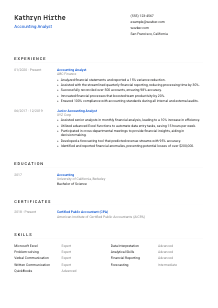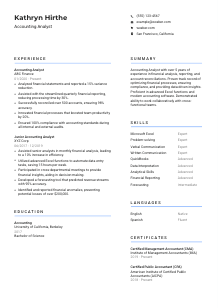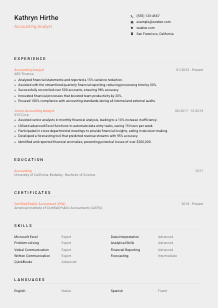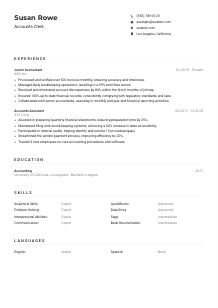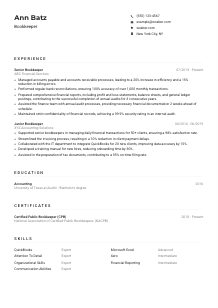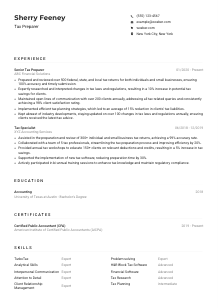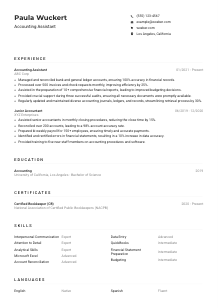Accounting Analyst Resume Example
Crunching financial figures, but your resume seems unbalanced? Delve into this Accounting Analyst resume example, structured with Wozber free resume builder. See how adeptly you can present your analytical acumen to align with job expectations, and plot your career in the black, not the red!
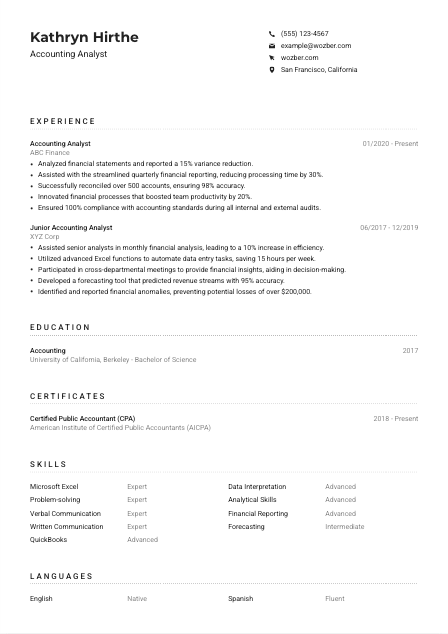
How to write an Accounting Analyst resume?
Diving into the world of numbers and financial statements, you, as a future Accounting Analyst, carry a unique set of skills crucial for navigating the complexities of finance and accounting. This journey towards creating an attention-grabbing resume isn't merely about listing experiences; it's about storytelling, where every line speaks volumes about your expertise and dedication. With the help of Wozber's free resume builder, this guide aims to transform your resume into an irresistible narrative, illustrating your unparalleled fit for your dream role. Let's transform those figures and data points into your personal success story!
Personal Details
The Personal Details section lays the groundwork for your resume. It's crucial to tune this chapter of your story so it resonates perfectly with the role of Accounting Analyst. Here's how to hone this section to make a lasting first impression.
1. Brand Yourself with Your Name
Your name is your personal brand's headline. Prioritize readability and prominence, setting the stage with confidence and clarity.
2. Job Title Precision
Directly beneath your name, echo the job title "Accounting Analyst" to align with the employer's expectations and confirm your career direction.
3. Essential Contact Info
- Phone Number: Ensure accuracy in your contact number to maintain uninterrupted communication channels.
- Professional Email: Opt for a simple and professional email format. Your email is a small yet crucial detail that signals professionalism.
4. Location Matters
Stating "San Francisco, California" not only matches the job location requirement but also demonstrates your readiness or flexibility for the role, removing any relocation uncertainties right from the start.
5. Online Presence
If you have a LinkedIn profile or a professional website, include it. Ensure their content is synchronized with your resume, presenting a cohesive professional narrative.
Takeaway
Think of the Personal Details section as your business card within the resume. Craft it with foresight, ensuring it's not only professional but also a perfect pitch for the Accounting Analyst role.





Experience
For an Accounting Analyst, the experience section is where your career narrative comes to life. It's more than a list; it's a series of strategically chosen stories showcasing your financial acumen and problem-solving prowess. Let's delve into tailoring this section.
- Analyzed financial statements and reported a 15% variance reduction.
- Assisted with the streamlined quarterly financial reporting, reducing processing time by 30%.
- Successfully reconciled over 500 accounts, ensuring 98% accuracy.
- Innovated financial processes that boosted team productivity by 20%.
- Ensured 100% compliance with accounting standards during all internal and external audits.
- Assisted senior analysts in monthly financial analysis, leading to a 10% increase in efficiency.
- Utilized advanced Excel functions to automate data entry tasks, saving 15 hours per week.
- Participated in cross‑departmental meetings to provide financial insights, aiding in decision‑making.
- Developed a forecasting tool that predicted revenue streams with 95% accuracy.
- Identified and reported financial anomalies, preventing potential losses of over $200,000.
1. Dissect the Job Req
Begin by breaking down the job description. Highlight requirements like "analyze financial statements," "conduct account reconciliations," and "support audit activities" as primary narratives for your job stories.
2. Present Your Roles Clearly
Chronologically list your positions, starting with the current or most recent. Every role should clearly mention the job title, company name, and your tenure there.
3. Reflect on Your Achievements
Craft accomplishment statements that mirror key job requirements. Use quantifiable achievements to add weight, such as "successfully reconciled over 500 accounts, ensuring 98% accuracy."
4. Numbers Speak Louder
Incorporate statistics to quantify your impact wherever possible. Statements like "reduced variance by 15%" instantly grab attention and paint a picture of your proficiency.
5. Relevance is Key
Keep your content focused on accounting and financial analysis. Tangential experiences might dilute the potency of your resume for the role of an Accounting Analyst.
Takeaway
Your experiences are testament to your capabilities. Directly aligning them with the job's demands not only showcases your qualifications but also demonstrates your potential as a stellar Accounting Analyst. Highlight, quantify, and detail with precision.
Education
For an Accounting Analyst, education lays the groundwork of expertise. While straightforward, the education section is a chance to further align with the role's requirements. The aim is to crystallize your academic background as the bedrock of your career.
1. Spotlight on Degree Requirements
Start by matching your educational credentials with those required in the job listing. For the Accounting Analyst position, highlighting a "Bachelor's degree in Accounting, Finance, or related field" is crucial.
2. Structure Matters
Maintain clarity and conciseness. List your degree title, field of study, the institution, and your graduation year, ensuring easy readability.
3. Match Degree and Field
Confirm that your degree and field of study directly reflect what's sought for the Accounting Analyst role. A "Bachelor of Science in Accounting" should be clearly stated if it's the degree you hold.
4. Course Highlights
Listing specific courses isn't always necessary but can add value, especially for roles requiring precise expertise. Although not required in our Accounting Analyst example, remember this for positions where detailed knowledge showcases your edge.
5. Additional Achievements
If you've graduated with honors or engaged in relevant extracurricular activities, mention these accomplishments. However, gauge their relevance based on the role level; for senior positions, these details might be less impactful.
Takeaway
Your education section should resonate with the job requirements, underscoring your foundational knowledge and dedication. It's more than just qualifications; it's a chapter of your success story awaiting recognition.
Certificates
In the domain of accounting and finance, certificates are not just accolades but affirmations of your ongoing commitment to excellence. Let's ensure the certificates section of your resume reflects precisely this mindset.
1. Highlight Pertinent Certificates
Align your certifications with the job description. For an Accounting Analyst role, having a "Certified Public Accountant (CPA)" designation, as preferred, instantly elevates your resume. Also, consider the relevance of other certifications like CMA.
2. Quality Over Quantity
Focus on listing certificates that are most relevant to the Accounting Analyst position. It's about showcasing quality credentials that highlight your fit for the role.
3. Date and Detail
Adding acquisition dates or validity periods for certifications can provide context, especially for those in fields where standards frequently evolve.
4. Pursue Pertinent Learning
The financial field is dynamic. An ongoing pursuit of relevant certifications not only showcases your dedication but also ensures you stay ahead in your professional journey.
Takeaway
Certificates are a powerful testament to your dedication to professional growth and expertise. Select and present them thoughtfully to reinforce your aptitude and enthusiasm for the Accounting Analyst role.
Skills
Your skills section is a concise inventory of the tools you wield - a direct reflection of your capability to excel as an Accounting Analyst. It's essential to tailor this section meticulously to hint at your readiness for the challenges the role presents.
1. Decipher Critical Skills
Review the job posting to identify both explicit and implicit skills. Skills like "proficiency with accounting software and Microsoft Excel" alongside "strong analytical, problem-solving, and data interpretation skills" are directly in line with an Accounting Analyst's requisites.
2. Curate a Match
List skills that align with the job demand. It's vital to balance hard skills, such as "financial reporting" and soft skills like "verbal communication" to present a well-rounded profile.
3. Precision is Key
Resist the temptation to list every skill you possess. Focus on those most pertinent to the role of Accounting Analyst, ensuring each skill listed is a pillar supporting your candidacy.
Takeaway
Approach your skills section as an opportunity to impress and convince. Every skill you list pledges a unique value you bring to the table. Showcase your toolkit with pride, always fine-tuning and adding to it.
Languages
In an increasingly globalized business environment, linguistic skills could offer an unexpected edge. While the role of Accounting Analyst may primarily focus on the proficiency in English, showcasing additional linguistic abilities might broaden your appeal.
1. Align with Requirements
Primarily, ensure you meet any specified language requirements as stated in the job description. For the Accounting Analyst role, "Proficiency in English required" should be prominently displayed.
2. Prioritize and Present
Highlight the languages essential for the role first, followed by any additional languages. Don't underestimate the value of showcasing multilingual skills, even if not explicitly demanded.
3. Honesty in Proficiency
- Native: The language you speak fluently and without hesitation.
- Fluent: You're comfortable in all forms of communication, both formal and informal.
- Intermediate: You can navigate conversations and written communications with some ease.
- Basic: You're familiar with common phrases and can understand or participate in basic conversations.
4. The Role's Scope
While the primary focus for an Accounting Analyst may not be multilingual capabilities, don't overlook the potential value this can add, especially in roles interfacing with international teams or clients.
5. Continuous Improvement
Leverage your language skills as a tool for personal and professional development. Each new language can open doors to new opportunities and enrich your professional interactions.
Takeaway
Languages are not simply a means of communication; they're bridges to understanding and opportunities. As you continue to develop your linguistic skills, view them as both a professional asset and a personal milestone.
Summary
The summary is the opening act of your professional story. It sets the tone, offering a snapshot of who you are, what you've achieved, and why you're the perfect fit for the Accounting Analyst role. Let's craft a summary that captivates and convinces.
1. Embrace the Role
Start with a strong introduction that aligns with the role. Mentioning over 5 years of experience in financial analysis, reporting, and account reconciliations immediately establishes your credibility.
2. Highlight Key Achievements
Draw attention to your ability to optimize financial processes, ensure compliance, and provide data-driven insights. This directly addresses the key responsibilities and requirements of the role.
3. Brevity is Brilliance
Keep your summary concise yet impactful. Aim for a quick read that makes a strong impression, focusing on how your skills and experiences make you the ideal candidate for the Accounting Analyst position.
4. The Invitation
Consider the summary as your invitation to the reader to dive deeper into your resume. It's your moment to shine; embody the confidence and competence that make you the right choice.
Takeaway
The summary is more than just an introduction; it's your narrative distilled into a few powerful lines. Through it, invite potential employers into your career journey, highlighting why you're not just suitable but exemplary for the Accounting Analyst role.
Your Accounting Analyst Career Launchpad
You've now navigated through the craftsmanship of a resume tailored for the world of Accounting Analysis. Armed with these insights and the power of Wozber's free resume builder, you're set to transform your professional narrative. Let your story unfold in a way that showcases your expertise, dedication, and readiness to excel as an Accounting Analyst.
Remember, each section of your resume is an invitation to the reader to understand your unique professional landscape. Make every word count, and let your journey to success begin today.

- Bachelor's degree in Accounting, Finance, or related field.
- Minimum of 2-3 years of experience in accounting or financial analysis.
- Proficiency with accounting software and Microsoft Excel.
- Strong analytical, problem-solving, and data interpretation skills.
- Excellent written and verbal communication skills.
- Certified Public Accountant (CPA) designation preferred.
- Proficiency in English required.
- Must be located in or willing to relocate to San Francisco, CA.
- Analyze financial statements and report on variances.
- Assist with monthly, quarterly, and annual financial reporting.
- Conduct account reconciliations and resolve discrepancies.
- Collaborate with finance team to streamline and improve financial processes.
- Support audit activities and ensure compliance with accounting standards and regulations.





